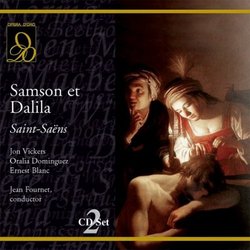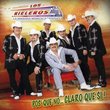Vickers and Dominguez are spectacular
L. E. Cantrell | Vancouver, British Columbia Canada | 10/01/2004
(5 out of 5 stars)
"Source: Live Broadcast from Amsterdam for Netherlands Radio, February 29, 1964.
Sound: Quite good, considering that this is a live performance before an audience, certainly better than many Od'O offerings. The audience is well-disciplined and discloses itself only through a few discreetly muffled coughs and polite applause at the ends of acts.
Format: Disc 1, Act I, 10 tracks, 43:46. Disc 2, Acts II and III, 14 tracks, 75:35.
Documentation: No libretto. Short history of the opera. Brief summary of the plot, by act. Nothing on the cast, conductor or circumstances of the recording. Track list showing timings.
"Samson et Dalila" was originally conceived as an oratorio, but it was refashioned as an opera before its first performance. To some opera fans, that oratorio attachment is an indelible stain. Of all operas, this one is probably most criticized for its static nature. However, consider the plot. In Act I we find rebellion, murder and cries for revenge. Act II has conspiracy, seduction and betrayal. Into Act III is crammed despair, redemption, a ballet, a rollicking pagan religious service and, finally, triumphant annihilation. And, oh, yes, along the way is some of the most memorable music ever written for the mezzo voice. As Basil Fawlty might ask, what more do you want, herds of wildebeest racing across the plains with Krakatoa exploding in the distance?
Jon Vickers delivers a truly magnificent Samson on this recording. I was so impressed that I immediately played the classic 1946 version with Jose Luccioni and the later Domingo/Waltraud Meier versions for comparison. Luccioni combined commitment with a strong dramatic tenor voice. Vickers gave even more intensity in a vast out-welling of his darkly shaded voice. Domingo sings with a beautiful, full sound, but by comparison with his two predecessors he seems uncommitted, even bland.
Oralia Dominguez, the great Verdi mezzo, easily held her own with the blazing performance of Vickers. That led to comparisons with the Helene Bouvier of 1946, Waltraud Meier and the contemporary Olga Borodina. I would guess that Bouvier had the smallest voice among the four, best in the middle of her range, and showing distinct differences in coloration when pushed to the very top or bottom. For all that, she found her way fully into the character of Dalila and offered dramatic precision with each note. Domingues, with a bigger, fuller voice, was as effectively in character as Bouvier. Of the four, Domingues sounds the oldest, but by no means elderly. To my mind, Dalila is not in the first blossom of youth, but rather someone entirely more sophisticated and exotic. Dominguez works for me. Meier, also larger of voice than Bouvier and in better vocal control than either of her predecessors, sounds bland by comparison. Like the otherwise admirable Domingo, she seems one step away from Dalila, commenting on her, rather than being her. On her recital disc, Borodina shows control to equal Meier's and dramatic sensibilities midway between Meier and Dominguez. (Alas, I do not have a recording of Borodina's 2001 Dalila, when she all but blew me out of my seat at the San Francisco Opera.)
As a resident of Western Canada, I am no judge of French accents. Those whose judgment I trust inform me that neither Vickers nor Dominguez are exactly Parisian, nor are Domingo and Meier. Bouvier and Luccioni, on the other hand, are said to be dead-on perfect.
The third major principal of the Amsterdam broadcast was that French stalwart, Ernest Blanc, as the High Priest of Dagon. He is always good in everything, but never the best. Paul Cabanel, who was nearly sixty in 1946 and would be making recordings for at least another six years, simply overwhelms his competitors.
The rest of the Amsterdam cast are sound, workmanlike and forgettable.
The Amsterdam conductor, Jean Fournet, was a major figure in the French repertory in the years straddling World War II. Of the conductors of the three complete version I compared, he was the undisputed winner when dealing with the music for Samson's scenes, especially in Act I, where he emphasized the bumptious and rhythmic qualities of the orchestration. He was the only one of the three conductors to bring the final bars of the opera to a climactic thump commensurate with the collapse of a temple. As for the ballet music and the tauntingly jolly duet of Dalila and the High Priest in Act III, Louis Fourestier of 1946 is the one to hear. Myung-Whun Chung sounds--you guessed it--bland in comparison with either conductor.
I regard this recording as an unexpected gem and easily worth five stars."
A Really Dynamic Duo
G. Dowling | St. Louis, MO, USA | 05/03/2006
(5 out of 5 stars)
"Mr. Cantrell's review is exhaustive and more than welcome in explaining the 5-star status of this recording. This opera (nee oratorio) has long left me lukewarm at best, if not downright bored. But based on the aforesaid review, I got a copy and now hear an almost new opera. The combination of Vickers and Dominguez is overwhelming -- many heads above their competition. These two were made for these roles and really sing the life into them. Everything else about the performance is first-rate, including the sound. At this ODO price, don't hesitate to get a copy and hear what "S&D" should sound like."
What a bargain!
Ralph Moore | Bishop's Stortford, UK | 09/20/2006
(5 out of 5 stars)
"You can of course buy this recording in the special edition Opera d'Oro Grand Tier packaging, complete with a libretto, but that is much more expensive than this bargain set and could hardly improve upon its sound quality, which is clear and full, being a radio broadcast of a live concert performance before a fairly quiet and appreciative audience - just the odd bronchial interjection but not too much to complain about. Nor would I wish to part with my two alternative favourite versions: the magnificent modern recording with Cura and Borodina in top form, excitingly conducted by Colin Davis, and the classic 1946 set with Luccioni and Bouvier; a kind of benchmark for later versions of this neglected opera, which really needs to be brought alive by the most dramatic and characterful of singers if it is not to sound too much like an oratorio. Nonetheless, this is a great performance, well conducted by Fournet with not, perhaps, a top-flight orchestra at his command - hence the Bacchanale lacks a little in thrills and sparkle - and two famous singers, ably supported by the estimable Ernest Blanc and a capable Dutch cast. I don't think I have ever heard Vickers sound better; his inimitable tone, not to everyone's taste, is best heard in the more declamatory passages and he misses some of the anguished inwardness achieved by Jose Cura in the Davis set, but it's a great assumption of a favourite role, even better than the contemporary commercial recording with Rita Gorr and the same baritone. Dominguez is wonderful - just occasionally a litle hollow of tone in the middle of the voice but often thrilling, both in her cavernous lower register and on top; this was grand voice which held its own as a riveting Amneris alongside Callas' Aida in the famous 1951 Mexico City performance. It's a pleasure to hear a really French voice in Blanc's High Priest, even if he lacks the low notes. (Incidentally, to hear the Old Hebrew and the principal roles sung to perfection, turn to the legendary 1919 acoustic recording of the trio "Je viens celebrer la victoire" with Caruso, Homer and Journet - a dream cast, with Journet's sonorous bass underpinning the great melody and spanning that last arcing phrase with consummate authority.) There is so much lovely music in this opera, not least the three great arias for Dalila, here searingly delivered by Dominguez. You really cannot go wrong with this set; it's one of Opera d'Oro's best, hence their decision to re-issue it in the de luxe format. If you already have a libretto from another set and are cheap/poor/frugal (like me), this one will do nicely.
"


 Track Listings (10) - Disc #1
Track Listings (10) - Disc #1